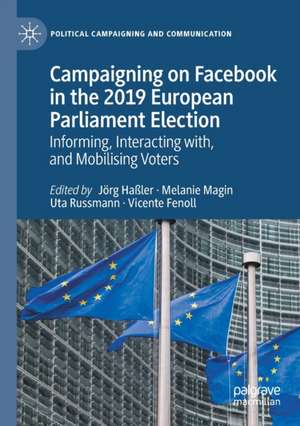Campaigning on Facebook in the 2019 European Parliament Election: Informing, Interacting with, and Mobilising Voters: Political Campaigning and Communication
Editat de Jörg Haßler, Melanie Magin, Uta Russmann, Vicente Fenollen Limba Engleză Paperback – 15 aug 2022
| Toate formatele și edițiile | Preț | Express |
|---|---|---|
| Paperback (1) | 890.23 lei 43-57 zile | |
| Springer International Publishing – 15 aug 2022 | 890.23 lei 43-57 zile | |
| Hardback (1) | 895.45 lei 43-57 zile | |
| Springer International Publishing – 14 aug 2021 | 895.45 lei 43-57 zile |
Din seria Political Campaigning and Communication
-
 Preț: 152.45 lei
Preț: 152.45 lei - 20%
 Preț: 690.35 lei
Preț: 690.35 lei -
 Preț: 353.61 lei
Preț: 353.61 lei - 18%
 Preț: 729.84 lei
Preț: 729.84 lei - 15%
 Preț: 695.85 lei
Preț: 695.85 lei - 18%
 Preț: 890.37 lei
Preț: 890.37 lei - 15%
 Preț: 643.65 lei
Preț: 643.65 lei - 15%
 Preț: 586.23 lei
Preț: 586.23 lei - 18%
 Preț: 785.42 lei
Preț: 785.42 lei -
 Preț: 415.52 lei
Preț: 415.52 lei - 18%
 Preț: 780.19 lei
Preț: 780.19 lei - 18%
 Preț: 724.50 lei
Preț: 724.50 lei -
 Preț: 382.57 lei
Preț: 382.57 lei - 18%
 Preț: 726.85 lei
Preț: 726.85 lei - 18%
 Preț: 895.58 lei
Preț: 895.58 lei - 18%
 Preț: 725.43 lei
Preț: 725.43 lei -
 Preț: 390.63 lei
Preț: 390.63 lei
Preț: 890.23 lei
Preț vechi: 1085.65 lei
-18% Nou
Puncte Express: 1335
Preț estimativ în valută:
170.35€ • 178.30$ • 141.78£
170.35€ • 178.30$ • 141.78£
Carte tipărită la comandă
Livrare economică 31 martie-14 aprilie
Preluare comenzi: 021 569.72.76
Specificații
ISBN-13: 9783030738532
ISBN-10: 3030738531
Ilustrații: XVII, 331 p. 32 illus.
Dimensiuni: 148 x 210 mm
Greutate: 0.42 kg
Ediția:1st ed. 2021
Editura: Springer International Publishing
Colecția Palgrave Macmillan
Seria Political Campaigning and Communication
Locul publicării:Cham, Switzerland
ISBN-10: 3030738531
Ilustrații: XVII, 331 p. 32 illus.
Dimensiuni: 148 x 210 mm
Greutate: 0.42 kg
Ediția:1st ed. 2021
Editura: Springer International Publishing
Colecția Palgrave Macmillan
Seria Political Campaigning and Communication
Locul publicării:Cham, Switzerland
Cuprins
Part I Framework.- 1. Campaigning for Strasbourg on Facebook: Introduction to a 12-Country Comparison on Parties’ Facebook Campaigns in the 2019 European Parliament Election.- 2. Social Media as a Campaigning Tool in Elections: Theoretical Considerations and State of Research.- 3. Analysing European Parliament Election Campaigns Across 12 Countries: A Computer-Enhanced Content Analysis Approach.- Part II The European Election Campaign 2019 in 12 European Countries: Country Analyses.- 4. With Greetings from Ibiza: The 2019 EP Election in Austria.- 5. A Day Off During the 2019 Folketing Election Campaign: Political Parties’ Use of Facebook in the EP Election in Denmark.- 6. France: Parties’ Communication Strategies After the 2017 Earthquake.- 7. European Issues, but National Campaigning of German Parties.- 8. Same Strategy, but Different Content. Hungarian Parties’ Facebook Campaign During the 2019 EP Election.- 9. When Nothing Happened But Much Changed: How Political Parties inIreland Used Facebook in the 2019 EP Election Campaign.- 10. The 2019 EP Election in Italy: A ‘Titanic’ Victory for Salvini’s League.- 11. It is Only a Drill: the 2019 EP Election Campaign on Facebook in Poland as a Testing Ground Before the Autumn Parliamentary Elections.- 12. Romania: Internal Affairs Set the Agenda of the 2019 EP Election Campaign.- 13. Spain and Facebook in the 2019 EP Election Campaign.- 14. Sceptical Sweden: Right-wingers Dominate, Traditional Campaigning Permeates During the 2019 EP Election.- 15. The UK: The Post-Brexit, Ghost Election.- Part III The European Election Campaign 2019 in 12 European Countries: Focused Analyses.- 16. European Party Groups: Transnational Continuation or Complement of European National Parties?.- 17. Populism on Facebook.- 18. Political Advertising on Facebook.- Part IV Conclusion.- 19. Information Greater than Mobilisation Greater than Interaction: Contours of a Pan-European Style of Social Media Campaigning.
Notă biografică
Jörg Haßler is Head of the junior research group “Digital Democratic Mobilization in Hybrid Media Systems” at LMU Munich, Germany.
Melanie Magin is Associate Professor at the Norwegian University of Science and Technology (NTNU), Trondheim, Norway.
Uta Russmann is Professor at the FHWien der WKW University of Applied Sciences of Management & Communication, Austria.
Vicente Fenoll is Associate Professor at the University of Valencia, Spain.
Textul de pe ultima copertă
“This remarkable book is the outcome of an international collaborative endeavour. It clearly shows that social networks have finally become an integral part of European election campaigns. With its careful methodological design, the study impressively demonstrates the particular value of cross-border comparisons and the need for research to take the national context into account.”
—Christina Holtz-Bacha, Friedrich-Alexander University Erlangen-Nürnberg, Germany
“A timely and stimulating book covering recent European Parliament elections in twelve nations. The common methodological background produces sound and comparable results, and its comprehensive language and broad scope of cases make this book a perfect fit for researchers, policymakers and citizens attentive to social media’s role in elections.”
—Karolina Koc-Michalska, Audencia Business School, France
Jörg Haßler is Head of the junior research group “Digital Democratic Mobilization in Hybrid Media Systems” at LMU Munich, Germany.
Melanie Magin is Associate Professor at the Norwegian University of Science and Technology (NTNU), Trondheim, Norway.
Uta Russmann is Professor at the FHWien der WKW University of Applied Sciences of Management & Communication, Austria.
Vicente Fenoll is Associate Professor at the University of Valencia, Spain.
Caracteristici
Provides much-needed empirical evidence for how national parties campaign on Facebook during EU elections Compares the findings of national case studies and integrates these into an overarching assessment of European campaigning on Facebook Contextualizes the 2019 campaign within the broader literature on European campaigns
